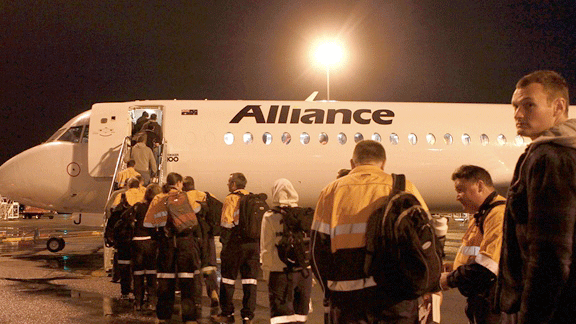Fly-in fly-out workers want more time at home

Fly-in fly-out (FIFO) workers on a major resources project in the Pilbara have rejected an offer on wages and conditions as part of negotiations for a new workplace agreement. The metal and construction workers – employed by contractor Laing O’Rourke on Rio Tinto’s Cape Lambert iron ore project – voted against the deal in a ballot on 13 June.
The result came despite a last ditch effort by the company to force the agreement over the line with cash inducements. On the morning of the ballot, workers were each offered a $2,000 payment if the proposal was approved. But the deal put to the vote ignored key union claims and provided for minimum wage rates around 25 percent less than those currently being paid.
The Australian Manufacturing Workers Union, which represents most of the workforce and called for a “no” vote, says that the dispute is significant in the resources sector. “These guys are actually on the job; they’re negotiating their own rights”, said AMWU state president Tony Hall, speaking to Red Flag.
“This hasn’t happened before in WA in these projects. Prior to now, they’ve all been greenfields agreements, which mean the guys don’t have any say. A greenfields agreement is basically a take it or leave it situation.”
At the top of the list of improvements the workers are seeking is a shorter “swing” on the job. Currently working to a four weeks on, one week off (4/1) roster, they are trying for a shift to the three weeks on, one week off (3/1) roster that management enjoy.
Travel to and from the job is included in FIFO workers’ off swing, leaving many with as few as five days at home after four weeks on site. “The roster change is a massive push from the workers so they can actually spend some quality time at home”, says Hall.
“It should be a national campaign”, argues Dylan Loats, who is an AMWU delegate on Curtis Island in Queensland. “I’ve worked all around Australia … the 4/1 roster, it’s a dinosaur roster really.”
On Curtis Island, approximately 9,000 workers (6,000 FIFO) across three Bechtel LNG operations have been bargaining for improved conditions, including a 3/1 FIFO roster, for more than six months.
“People get to their three week mark, and they’ve had enough”, says Loats. “Straight up, we’ve had suicides, there’s been depression, there’s marriage break-ups. There’s statistics to support all of this, which we’ve put to the company, but they’re not into it whatsoever.”
Bechtel, the largest construction and engineering company in the US, has so far refused to move on any of the workers’ central claims, including a better deal for locals who don’t get paid for all of the time it takes to travel to and from the Island. Gate to gate local workers are gone for 13.5 hours every day but paid for only 10.5 hours.
A practice called “motelling” is also a major issue for FIFO workers on Curtis Island. Loats explains: “When FIFO started, you’d get a room and it’s yours for the project. It’s your own little home. You can set it up and you don’t have to pack it up. But now motelling has snuck into the agreements.
“Basically, you come in, unpack your box and then you have to pack it up in a month. You can’t really make it homely for yourself.” Often, Loats says, rooms aren’t available when workers get back on site, and it can be hours before possessions are brought out of storage.
The current Bechtel arrangement is also a greenfields agreement that the company locked in at the end of the WorkChoices era. Loats says that now is workers’ chance to win better conditions for the future. “I’m just hoping people stick together and try to get something better out of it.”